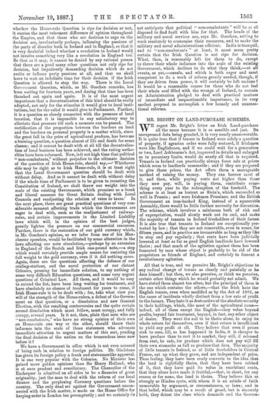MR. BRIGHT ON LAND-PURCHASE SCHEMES.
WE regret Mr. Bright's letter on Irish Land-purchase all the more because it is so sensible and just. Its unexpressed data being granted, it is very nearly unanswerable.
It is quite true that if tenure in Ireland were solely a question of property, if agrarian order were fully restored, if Irishmen were like Englishmen, and if we could wait for a generation or two, Lord Ashbourne's Act, improved in details and enlarged as to pecuniary limits, would do nearly all that is required. Tenants in Ireland can practically always force sale at prices which seem to landlords reasonable ; and if they are prepared to give those prices, the Act offers them a manageable method of raising the money. They can borrow most of it, and then, while paying rents not higher than those they now pay, will, in paying them, contribute some- thing every year to the redemption of the freehold. The scheme is at least as lenient as Stein's, which succeeded so well in Prussia ; and were Irishmen Prussians, and the British Government an iron-backed King, instead of a squeezable Assembly, there would be little further necessity for discussion. The scheme, which involves a minimum both of risk and of expropriation, would slowly work out its end, and make the majority of tenants in Ireland freeholders of their farms: It is also true that tenants in Ireland are exceptionally pro- tected by law ; that they are not removable, even in name, for fifteen years, and in practice are irremovable as long as they like to stop and pay regularly ; that rents have been judicially lowered at least as far as good English landlords have lowered theirs ; and that much of the agitation against them has been fomented by men whose object is probably to be rid of the proprietors as friends of England, and certainly to foment a revolutionary agitation.
All that is true, and we perceive Mr. Bright's objections to any radical change of tenure as clearly and painfully as he does himself ; but then, we also perceive, or think we perceive, certain other things which ho would probably not admit. We have stated them almost too often, but the principal of them is the one which contains the others,—that the Irish hate the English tenure, even when modified as by the Act of 1881, as the cause of incidents wholly distinct from a low rate of profit to the farmer. They bate it as destructive of the absolute security in their holdings, which, like most of the agricultural races— indeed, all of them except the English—they value beyond profits, beyond fair treatment, beyond, in fact, any other object of desire. They want the soil to be theirs alone, to enjoy its whole return for themselves, even if that return is insufficient to yield any profit at all. They believe that even if prices sink to zero, till, as has happened in India, it is cheaper to burn produce than to cart it to market, they will, if released from rent, be safe, for produce which does not pay will fill their own stomachs as fall as produce that does. The majority of little tenants in Ireland, as of little freeholders in Central France, eat up what they grow, and are independent of price. Thus feeling, they have been ready converts to the idea that the land is rightfully theirs, that they have been robbed of it, that they have paid its value in exorbitant rents, that they alone have made it fruitful,—that, in short, for any reason or for none, the land is theirs. They believe this as strongly as Hindoo ryots, with whom it is an article of faith unmovable by argument, or circumstances, or laws ; and in that belief, which may be a result of greed, but is sincerely held, they detest the class which demands and the Govern- ment which enforces payment of rent. They have grown, in brooding over this grievance, unreasonable even to insanity. They hold the whole social and political system, all the laws, all the Courts, all the Executive forces, to have been organised and kept up merely to exact rent, and even fancy that in refusing it, or a slice of it, they are " paying off " the British Government, which, except as trustee of order and the laws, .does not care, and has no reason to care, one straw whether -rents are paid or not. If a decree of Heaven made Ireland freehold to-morrow, the British Government would be exactly where it is, or with a little more revenue, perhaps, from the whisky excise. So incurable is this belief, or feeling, or un- -reason, that it poisons the whole morality of Ireland, as well as her social life ; makes men actually unable to see that the " Plan of Campaign " is naked brigandage ; spoils all representa- tion, by stopping all decent candidates on the threshold of the .hustings ; and impedes all industrial enterprise, the incessant conflict about one form of investment impairing the security of all other forms of capital. Until it is removed, true order, order springing from moral feeling, is impossible in Ireland, and many grave observers believe that the only practicable method of removal is in some way to make the tiller the possessor of the soil. Even Mr. Bright, as he showed by his own Purchase clauses, is inclined to this view, and the difference between him and us really resolves itself into one of comparative speed. He holds that the conver- sion should be effected slowly, and at the expense of the ;peasant alone ; we hold that it should be effected rapidly, if . possible with even dramatic speed, and in part at our ex- . pense. Our argument for speed is that if we allow a genera- • lion to be demoralised by this struggle, as Ireland is being • demoralised, a people to whom the State owes as much duty as it owes to any other beneath the flag will be morally • ruined past recovery, and will perish of incessantly re- newed internal contests, each one directed to the theft of some kind or other of private property. That result, we admit, as we have read history, would not occur were ` Ireland independent, because the minority would, at some point or other, restore law by the unsparing use of force, and - the literal destruction of the anarchical element in society ; but it will occur under British rule, which prohibits civil war. It is the morale of Ireland, and the reason of Ireland, which we desire to restore, not its physical comfort ; and to restore it, the Kingdom which is in part responsible for the social disorder, responsible, if only because it has pro-. hibited the natural contest and survival of the fittest, may, in our judgment, reasonably bear part of the pecuniary burden. How much it should give or risk, we cannot decide ; but the part of the burden it may most fittingly and wisely bear is, we think, the Sinking Fund to be established to extinguish the Purchase loan. Whether it is possible to arrange a rapid scheme which shall not be confiscatory, not unworkable, and not unduly favourable to tenants who have defied the obliga- tions of contract, is a different matter. We think ourselves it is ; but we fully admit that to men probably far abler than our- selves the difficulties seem insuperable, and we ourselves are doubtful whether it can be done without measures, especially in connection with rent-charges, tithes, and mortgages, which • to the average British mind will seem almost outside the con- templation of statesmen. Nothing is so difficult as to frame a measure revolutionary in intention and wide in area, which shall yet receive the full assent of a people accustomed to ordinary and more cautious methods. It took in Prussia the whole strength of a military Government, which had no hesi- tation in enforcing its orders by military law. Mr. Bright, in some clauses of his letter to which we have sot adverted, raises another question which a little surprises as. He objects to expropriation in se, says many landlords would not wish to sell, and is afraid of their all beooming absentees. Is it not a little too late for that argument ? Did the landlords wish for judicial rents ? Surely the landlords are all expropriated already. The tenants in reality hold perpetual leases, and what is the difference between turning the land- lord into the mere owner of a rent-charge, as we have done, and expropriating him / Nobody is proposing that he should sell his castle, or its demesne, or his home farm, or anything else which he occupies and uses, and which, if he had but money, would still keep him at the top of county society. If the Irish landlord, when bought out, will be an absentee, why is he not an absentee now, when he has no more power to influence his tenants than if he lived in the planet Mars ? He cannot even hunt over his lands without popular permission. We have not the slightest wish to deprive Ireland of its most civilised class ; but our contention is that it can only be useful in its influence on society when the agrarian war is over, when hate has been allayed, and when the landlord, unburdened by an internecine quarrel, can step forward as the natural representative of the opinion of his district. What is the value of a position in which a man is so detested that the neighbours will elect any man who threatens him sooner than himself, that they regard his advice as intended for their detriment, and that they sell their consciences rather than not have vengeance upon his agents ? Ireland is one of the most aristocratic countries in the world ; but the aristocratic class is paralysed, because it lives on rent. We would ask Mr. Bright, if Ireland were independent, how long the landlords would be in possession of their farms. Six weeks ? Well, we want to effect honestly and soberly the social change, not in itself immoral, which, if we were away, would be effected dishonestly and with mad precipitation. Indeed, as it seems to us, Mr. Bright wants the same thing, for we do not suppose he intended either that his own Purchase clauses in the Act of 1881, or Lord Ashbourne's Act, both of which he strongly and most justly defends, should be made practically ridiculous by a general refusal of the landlords to sell.
























































 Previous page
Previous page